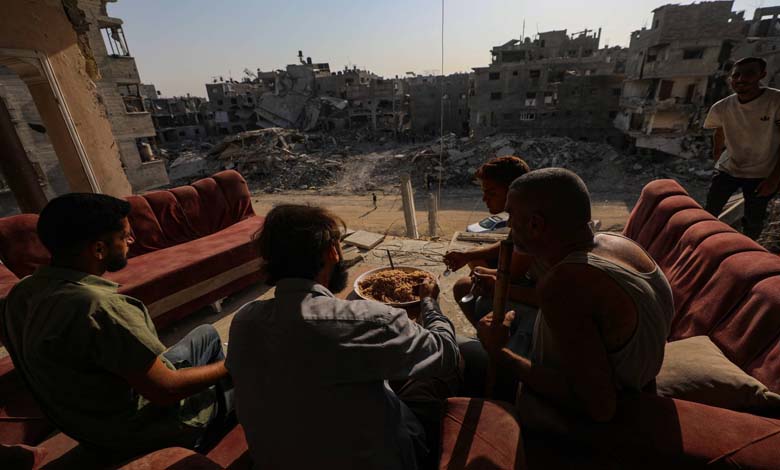Harsh living and the specter of war: Gaza’s exhausted residents still suffering

While the truce has given Gaza’s residents a fragile sense of hope, it has not dispelled the deep bitterness of hunger, deprivation, or the lingering fear that the war could reignite. Two years into the conflict between Hamas and Israel, Gaza’s weary population continues to face dire living conditions marked by scarcity, destruction, and psychological exhaustion. The sounds of bombardment have faded, but two weeks after the ceasefire took effect, the specter of war still looms large over this battered enclave. Daily survival — finding food and water — remains a constant struggle.
-
Arab States Reject Israeli Plan to Divide Gaza
-
The recent escalation in Gaza: will it accelerate international oversight of the truce?
Umm Mohammad Mohareb, 45, a displaced woman living in a tent in Mawasi Khan Younis, says, “Things are calmer now, we don’t hear bombing like before, but fear is still in our hearts. We never know when things might get worse again.” On Sunday, Israel launched a series of airstrikes in response to the killing of two soldiers, raising fears of a collapse of the fragile truce. The strikes, which killed dozens of Palestinians, prompted Israel to reaffirm its commitment to the ceasefire, though the situation remains precarious. Implemented on October 10, the ceasefire continues to be punctuated by violence.
On Thursday, a Palestinian man was killed in a drone strike near Khan Younis. The Israeli army told Agence France-Presse that it had identified “a terrorist crossing the yellow line,” a designated withdrawal boundary, and moving toward Israeli troops. The army said it “directed a drone to eliminate the threat.” In the same area, soldiers ordered civilians to move west of the yellow line, outside Israeli control. Footage from AFP showed Palestinians carrying buckets, brooms, and backpacks, walking amid rubble and makeshift tents — a stark portrait of devastation.
-
Serious truce violation: Israel strikes Rafah after vehicle targeted in Gaza
-
Hamas bullets dictate the ceasefire in Gaza… as international pressure mounts for disarmament
Despite the reduction in hostilities, living conditions remain dire. According to the United Nations, humanitarian aid entering Gaza is still far from sufficient. The International Court of Justice ruled on Wednesday that Israel must facilitate the delivery of aid to meet Palestinians’ basic needs. “Every day, we only think about how to find food for the children,” says Umm Mohammad.
In northern Gaza, Abu Rafiq Zaqout, 47, describes “an unbearable life.” He calls Gaza “a disaster zone,” where “rubble still blocks the roads and clean water barely reaches us.” For 26-year-old Ali Al-Ajrami from Sheikh Radwan neighborhood, “Life is extremely harsh. There are no conditions for normal living.” He explains that the local market was completely destroyed by Israeli forces, forcing residents to walk long distances to reach other areas amid ruined roads and the absence of public transport.
-
Massive destruction as thousands of displaced Palestinians return to Gaza
-
Gaza After the Truce: Total Destruction and a Return Amid the Rubble
World Health Organization Director-General Tedros Adhanom Ghebreyesus said Thursday that “the situation remains catastrophic because the aid entering Gaza is insufficient.” He warned that “hunger is not receding” despite the ceasefire. The war has also devastated the healthcare system: around 15,000 patients are still waiting for permits to receive treatment outside Gaza, according to WHO, which reported evacuating 41 critical cases.
On Wednesday, 54 unidentified bodies from Gaza were buried in a mass grave in Deir al-Balah. The bodies, wrapped in white bags, were laid side by side and covered with sand by a bulldozer. Hamas stated that several of the corpses bore signs of abuse. When asked by AFP about the return of Palestinian bodies as part of a prisoner exchange, the Israeli army said it acts “in full compliance with international law.”
-
Between War and Reconstruction: How Can Gaza’s Economy Rise from the Rubble?
-
The War Winds Down in Gaza as Israel Begins Gradual Withdrawal
Despite the ceasefire, Gaza remains gripped by a profound humanitarian crisis. Hunger, fear, and ruin define the daily lives of its residents — civilians who, between shattered homes and chronic deprivation, endure the heavy cost of a war that has offered them only a fragile and uncertain pause.
-
Gaza Finally Breathes Again… Ceasefire Announcement Moment by Moment
-
Gaza Bids Farewell to Fire with Cheers and Tears, Awaiting the Implementation of the Agreement
-
From Spark to Agreement: Key Milestones in the Gaza War Over Two Years
-
Gaza Negotiations: Cautious Optimism in Sharm el-Sheikh as Mediators Join the Talks
-
The Fire of Loss in the Gaza War: No Bodies, No News












